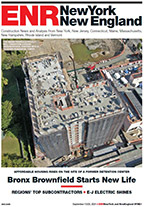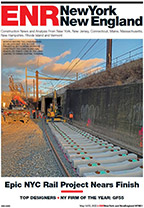

Effective equipment management plays a critical role in remaining competitive as more firms vie for fewer jobs. Although equipment rentals typically make up 1% to 3% of total project costs, a non-functioning machine can cripple a jobsite. As a result, contractors are increasingly using turnkey rental services to reduce overhead and decrease downtime, improve safety and increase profitability. A managed equipment approach can be especially important on large, schedule-intensive projects.
The $8.7-billion CityCenter development in Las Vegas, for instance, used 800 buggy carts and 2,500 scissor lifts and employed 9,000 workers. The project called for building 18 million sq ft of enclosed space on 67 acres within three years. General contractor Tutor Perini Building Corp., a unit of Tutor Perini Corp., Sylmar, Calif., hired Las Vegas-based Ahern Rentals to supply, maintain and repair equipment around the clock.
"We needed someone available 24/7 to take care of problems the same day," says Shelton Grantham, Tutor Perini's vice president of field operations.
A holistic approach toward tool and equipment management saves both time and money, providing another bidding weapon to win work and stay profitable. Only 29% of a craft worker's day is spent on "direct wrench time," according to a five-year study by The Construction Industry Institute, Austin, Texas. Travel takes up 17% of an average workday and another 13% is spent waiting, the 2011 study concludes. Underutilized manpower quickly eats away at already slim margins.
"Having workers deal with equipment issues isn't the most effective use of their time," says Juan Corsillo, senior vice president of sales and marketing at United Rentals Inc. "There is a huge benefit to contractors to be more thoughtful about how they manage their equipment."
Previously, turnkey equipment management was seen only on remote projects and industrial jobsites. But building projects, both large and small, can benefit. Companies like United Rentals offer custom-stocked, federally compliant mobile tool cribs. The company assigns craft workers a bar code card to check out items as needed, similar to a library system. Tools are traceable using global positioning systems and radio frequency identification.
Tool cribs can offer everything from hardware and goggles to clothing and welding rods. United claims it can reduce jobsite tool loss to less than 3%, compared with the industry average of 30% to 40%. An onsite company technician ensures that tools remain in proper working order, thereby eliminating wasted time and replacement purchases.
"It marks an evolution in rental fleet management," Corsillo says. "There is a tremendous amount of waste. People often rent more equipment than they need."
Machinery can sit unused on jobsites because workers are reluctant to return an item they might need later. Poor communication also leads to equipment staying on a jobsite longer than needed and to duplicate rental orders for the same piece of machinery.
Turnkey asset management brings experienced rental company staff on board as the project's procurement arm. The all-inclusive approach includes acquiring non-traditional items on behalf of the client through a third party—items such as portable restrooms, ice water and storage tanks. Company involvement can be fully integrated throughout the project, with equipment experts participating in safety and planning and in scheduling meetings for proactive cost prevention.
"Turnkey asset management provides economic and operational certainty for tools, supplies and equipment. As these projects get larger and more complex, it can result in some significant dollars," says Gary Bernardez, president of AMECO, a Greenville, S.C.-based unit of Fluor Corp.
Services that ratchet up craft worker wrench time include planning or forecasting; preventive maintenance and repairs; parts inventory management; fueling and lubrication; and operator training and site-based program management.
AMECO also offers air shelters, which can save 8% to 12% on labor costs, the firm says, by placing personnel at or near the worksite for safety meetings, breaks and meals. They can also eliminate or greatly reduce travel time. The inflatable shelters, which range from 400 to 40,000 sq ft, can house 50 to 900 employees. A thin air pocket inside the wall lining provides thermal insulation while shock-absorbing anchor lines allow the structure to resist up to 8-psi blast waves.
"Rental companies are essentially in the transportation business, loading and unloading equipment," Corsillo says. "A turnkey approach enables us to become more of a partner rather than a piecemeal commodity."
Integrated partnering is something AMECO understands, working as a subsidiary of Irving, Texas-based Fluor—the nation's second-biggest contractor, according to ENR's Top 400 ranking. AMECO is Fluor's procurement and asset-management arm, providing bundled services that include, among other things, equipment operators. Early project involvement is critical for maximizing benefits.
"If we are able to convince an owner or contractor to pursue an integrated delivery, it can create some price certainty," says Bernardez. "The earlier we can become involved, the greater the savings."




Post a comment to this article
Report Abusive Comment